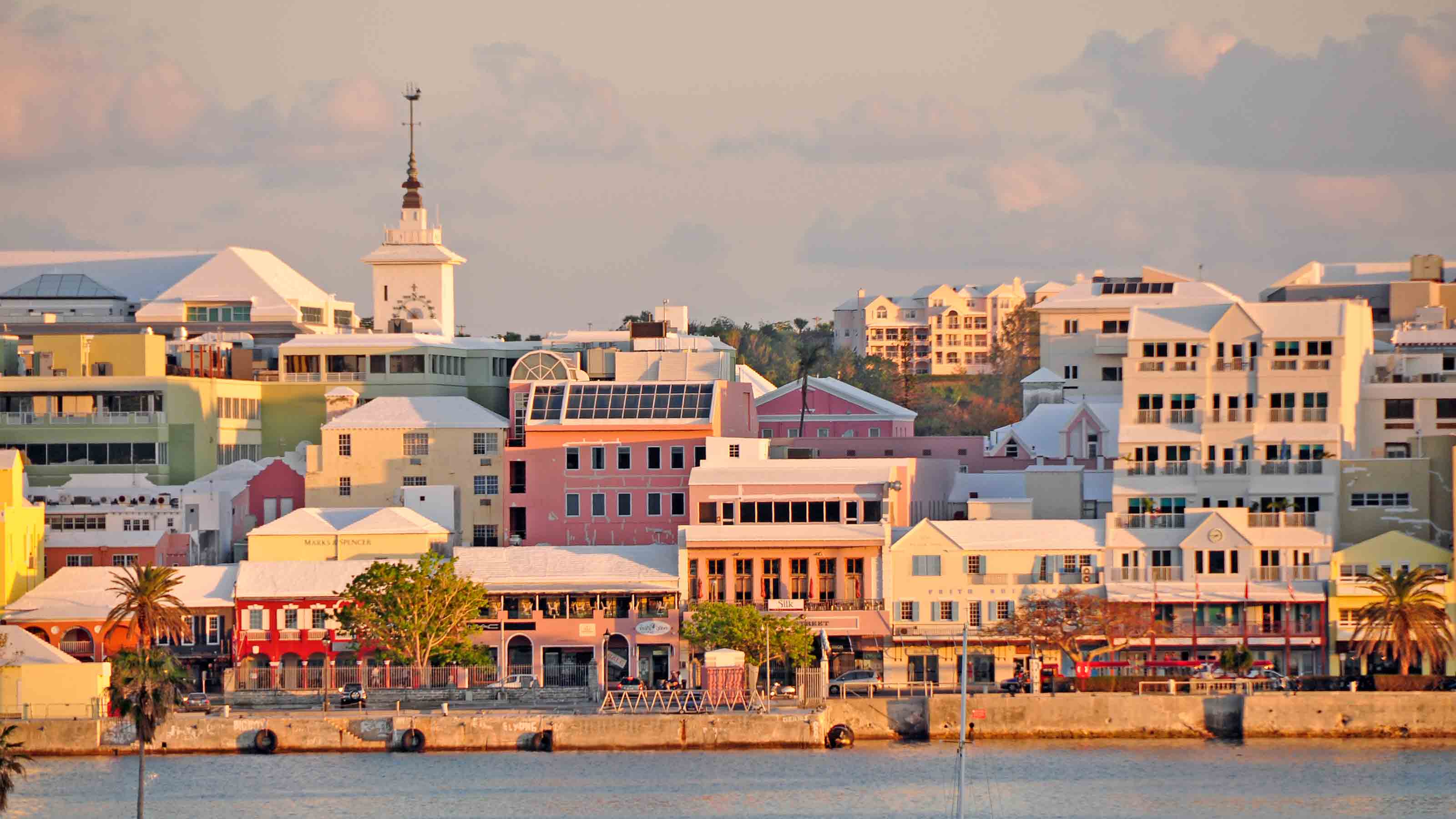7 Foreign Countries Luring Americans to Work Abroad During the Pandemic
Work remotely – really remotely – in these appealing destinations offering special visas for American workers.


Profit and prosper with the best of Kiplinger's advice on investing, taxes, retirement, personal finance and much more. Delivered daily. Enter your email in the box and click Sign Me Up.
You are now subscribed
Your newsletter sign-up was successful
Want to add more newsletters?

Delivered daily
Kiplinger Today
Profit and prosper with the best of Kiplinger's advice on investing, taxes, retirement, personal finance and much more delivered daily. Smart money moves start here.

Sent five days a week
Kiplinger A Step Ahead
Get practical help to make better financial decisions in your everyday life, from spending to savings on top deals.

Delivered daily
Kiplinger Closing Bell
Get today's biggest financial and investing headlines delivered to your inbox every day the U.S. stock market is open.

Sent twice a week
Kiplinger Adviser Intel
Financial pros across the country share best practices and fresh tactics to preserve and grow your wealth.

Delivered weekly
Kiplinger Tax Tips
Trim your federal and state tax bills with practical tax-planning and tax-cutting strategies.

Sent twice a week
Kiplinger Retirement Tips
Your twice-a-week guide to planning and enjoying a financially secure and richly rewarding retirement

Sent bimonthly.
Kiplinger Adviser Angle
Insights for advisers, wealth managers and other financial professionals.

Sent twice a week
Kiplinger Investing Weekly
Your twice-a-week roundup of promising stocks, funds, companies and industries you should consider, ones you should avoid, and why.

Sent weekly for six weeks
Kiplinger Invest for Retirement
Your step-by-step six-part series on how to invest for retirement, from devising a successful strategy to exactly which investments to choose.
Tired of working remotely from your kitchen table during these pandemic days? If there are no restrictions on where you can plop down your work laptop, consider a sunny Caribbean island or an idyllic European village as your office for the next year.
Despite COVID-19 still spreading throughout the globe, a growing list of mostly small, tourist-reliant countries are opening their borders to remote workers. These countries have special visas that allow foreigners – including Americans – to live and work remotely for a year or more. Participants must already be employed in their home country or a freelancer, and are prohibited from taking employment in the host country. Health insurance and minimum income levels generally are required, though specifics vary from country to country.
Take a look at seven countries with remote working opportunities:

Barbados
The Caribbean island’s “Welcome Stamp” remote work visa is a bit pricey -- $2,000, or $3,000 for a “family bundle.” The visa is good for one year but can be extended. Participants aren’t liable for Barbados income tax. And the island has some of the best internet access, health facilities and weather in the Caribbean.
Barbados also has an extremely low rate of COVID-19 cases, with only 174 positive cases as of Sept. 3. For more information, visit https://www.barbadoswelcomestamp.bb/visas/.

Bermuda
Bermuda offers a year-long residency certificate for $263. It allows participants to enroll in post-secondary education in the North Atlantic island nation. Applicants must be over the age of 18 and “demonstrate good character and not have conviction for an indictable offence.” Travelers who don’t want to spend an entire year can stay up to six months in Bermuda without a visa.
Bermuda has one of the world’s lowest COVID-19 infection rates – 172 positive cases, as of Sept. 3. For more information, visit https://www.gov.bm/articles/one-1-year-residency-certificate-policy.

Croatia
The Croatian government recently announced it may soon join the list of countries offering a remote worker visa. Details are forthcoming, but the Croatian prime minister is backing the plan, which still needs approval from parliament. Croatia already is a popular tourist destination, and with a relatively affordable cost of living, the Balkan nation’s pending “digital nomad” program could be among the most popular available.

Estonia
Estonia’s “Digital Nomad Visa” allows foreign workers to live and work remotely in the Baltic European country for a year at a cost of 100 euros (about $118). (Note: The European Union, of which Estonia is a member, currently has barred American travelers because of the United States’ high level of COVID-19 cases. The ban is expected to be lifted once infection rates drop in the U.S.)
Despite Estonia’s population of only 1.3 million, the nation is among the most wired and digitally advanced in Europe (it’s the home of Skype and many other digital companies). English is widely spoken, particularly in the capital of Tallinn. For more information, visit https://e-resident.gov.ee/nomadvisa/.

Georgia
The country of Georgia’s remote working program is designed for “freelancers, full-time employees and business owners,” allowing visitors to stay 360 days without a visa. Foreigners from 95 countries, including the U.S. and Canada, are welcome to apply. And the review time for applicants is lightning quick – only 10 days.
Located in the Caucasus region at the crossroads of Western Asia and Eastern Europe, Georgia – slightly smaller in size than South Carolina – is one of the most ecologically diverse places in the world, with climate zones ranging from subtropical to alpine to semi-desert. For more information, visit https://agenda.ge/en/news/2020/2654.

Mexico
Mexico's temporary resident visa allows visitors to live in Mexico for a year and can be extended for an additional three years. Applicants must have income of more than $1,620 per month or a bank account balance greater than $27,000. Temporary residents may apply for a permanent resident permit after four years, provided they have paid Mexican income taxes. After five years of legal residency, a resident may be eligible for naturalization.
For more information, visit https://residencies.io/residency/mexico/temporary-residency/mx1.

Spain
Freelancers and the self-employed are eligible to live and work in Spain for up to one year. But patience is key, as the paperwork for Spain’s self-employment visa is much more involved than other countries. Forms must be filled out in Spanish, with an expected processing time of at least 90 days. An FBI or state background check also is required.
For more information, visit http://www.exteriores.gob.es/Consulados/MIAMI/en/InformacionParaExtranjeros/Documents/Self-employment%20visa%20requirements.pdf.
Profit and prosper with the best of Kiplinger's advice on investing, taxes, retirement, personal finance and much more. Delivered daily. Enter your email in the box and click Sign Me Up.

Sean Lengell covers Congress and government policy for The Kiplinger Letter. Before joining Kiplinger in January 2017 he served as a congressional reporter for eight years with the Washington Examiner and the Washington Times. He previously covered local news for the Tampa (Fla.) Tribune. A native of northern Illinois who spent much of his youth in St. Petersburg, Fla., he holds a bachelor's degree in English from Marquette University.
-
 Nasdaq Leads a Rocky Risk-On Rally: Stock Market Today
Nasdaq Leads a Rocky Risk-On Rally: Stock Market TodayAnother worrying bout of late-session weakness couldn't take down the main equity indexes on Wednesday.
-
 Quiz: Do You Know How to Avoid the "Medigap Trap?"
Quiz: Do You Know How to Avoid the "Medigap Trap?"Quiz Test your basic knowledge of the "Medigap Trap" in our quick quiz.
-
 5 Top Tax-Efficient Mutual Funds for Smarter Investing
5 Top Tax-Efficient Mutual Funds for Smarter InvestingMutual funds are many things, but "tax-friendly" usually isn't one of them. These are the exceptions.
-
 How to Ask for a Pay Raise in 5 Easy Steps
How to Ask for a Pay Raise in 5 Easy Stepscareers When it comes to asking your boss for more money, all you need is good timing and the right preparation.
-
Myths and Realities of Employment Law
business There are fewer "illegal" interview questions than you might think. And you may feel your workplace is hostile, but would a civil court judge agree?
-
Baby-Boomers, Here's Your Wake-Up Call
business The workplace has changed dramatically. These days, there's more to maintaining a career than your day job. Get another oar in the water, fast.
-
What's Your Interview Style?
business Here's a look at four distinct behaviors HR directors see all the time and how you can present yourself in the best light.
-
4 Sticky Job-Interview Situations and How to Handle Them
business The person you are supposed to meet isn’t in the office. Or they want you to dish gossip on your previous employer. Here's how to finesse such awkward moments.
-
Interviewer Asking for Your Facebook Password? Be Wary
business If a potential employer requests that you hand over your log-in information to social media sites during an interview, expect worse if you're hired.
-
Planning to Ask for a Pay Raise? Prepare First
business Before talking with your boss, make sure you're presenting the best case as to why you deserve a salary increase.
-
Social Networking for Job-Seeking Boomers
business Advice for seasoned professionals on how to benefit from social media during a job search.
